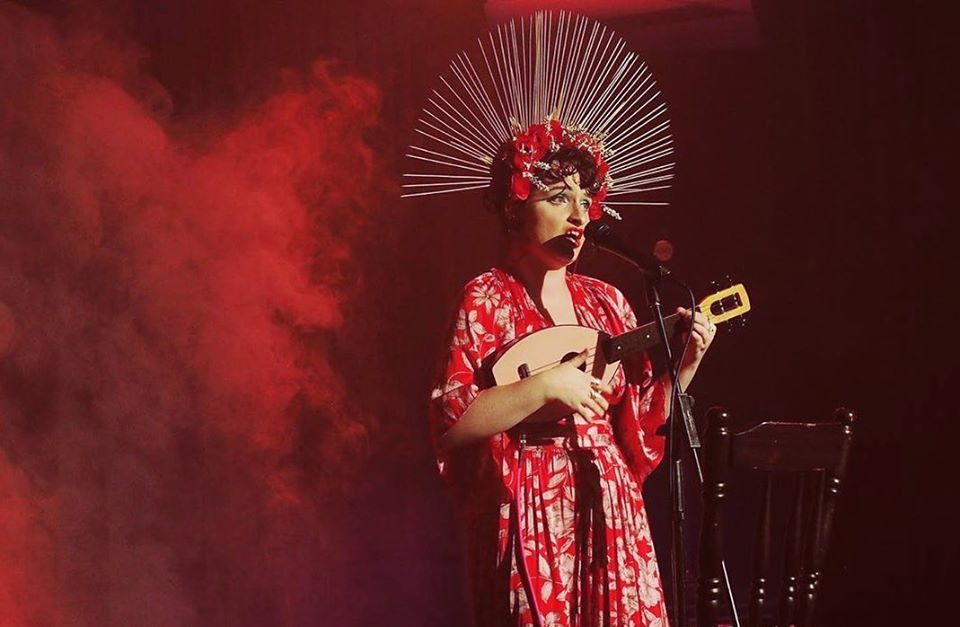Image description: a woman with short, dark hair and pale skin has both a surprised and blank expression, as she looks into the camera. She holds a banjo; wears a floral wrap-top; a flower crown; and holds her right hand in a peace sign next to her shoulder.
By Patrick Gunasekera
As I entered the cosy exposed brick space of Lazy Susan’s Comedy Den, I was greeted by Stevie Wright’s “Evie” and Edwyn Collins’ “A Girl Like You” playing loudly over the speakers. Those dynamic guitar riffs and rash vocals had no idea what they were getting into opening a show like Jamie Mykaela’s Daddy.
I didn’t know quite what to expect either. But as Mykaela welcomed us into her show with her iconic big smile and sardonic drawl, it became clear that this was no ordinary night out at the Comedy Den. This was Nat Randall’s The Second Woman, but a jukebox cabaret where all the seedy male participants were the big names of pop music past and present.
Brandishing her booming vocals, tender warbles and limber ukulele strumming, Mykaela unsparingly struts and mockingly retches her way through a thorough curation of blatantly disgusting songs. From lyrics like “You’re sixteen, you’re beautiful, and you’re mine”, to a sprightly Beatles number endorsing violence against young women (there’s really no other way to put “Run For Your Life”), Mykaela straps us in for a very important lesson in culturally-endorsed Lolita complexes and how it’s showed up and grossly taken advantage of women and fems from the “baby groupies” of 1970s New York, to the Talmudic “first Eve”.
About halfway through the show I felt like getting up and leaving the room out of disgust, but I knew that as man I needed to witness all of it, to sit with a miniscule fraction of the tears the women and fems around have bottled up inside them from a lifetime of these patriarchal horrors (although Mykaela did make it very clear at the start of the show that patrons could walk out at any time without judgment). For me, the show was a necessary rollercoaster ride of cringes, anger, and sadness.
Watching Mykaela smile and joke and gag her way through Daddy, I saw an image of every woman forced to grin and bear it through unwanted comments, attention, and harassment at the family barbecue, the workplace, on the streets or on public transport. Her final song, a Lana Del Ray number performed with a quiet but tangible sorrow, gave me a glimpse into just how jaded one becomes with such incessant infantilising and objectification throughout their childhood and teenage years.
But from time to time, you would see Mykaela smiling at the ground or to the side of the stage, or surpassing the sharp spotlight that illuminated her and singing to a time, place, and person far more important than a man like me who’d come to review her. This show, this performance, is for herself, but she also sings for women and fems everywhere and throughout history. With her deadpan glares and exultant command over her audience, she has full agency on her stage, and it’s very clear she doesn’t need me to tell her this.
Toward the end of the show, she tells us that all this fetishising and entitlement just doesn’t stop. But as a cis man in that audience, what she was really saying was that it can, and has to, stop with me. I headed home that night with a heavy heart, believing the show had been greatly cathartic and empowering for the non-cis men in the room. With no answers, no comfort, and just the cold hard truth and her bellowing jibes, Mykaela delivered a valiant and heartfelt show from which everyone could gain something of great significance. Daddy is a triumph of Fringe, a kind of rawness and urgency you’d rarely find in a mainstage show, and one with the guts and finesse to say exactly what needs to be said.
Jamie Mykaela: Daddy ran until the 16th of February.
Four spiky halo crowns out of five
Patrick Gunasekera is the brown bombshell Perth needs and doesn’t deserve, and a queercrip Sinhala interdisciplinary artist making trouble across writing, visual media and performance.
Image credit unknown. Please contact Pelican if you took this photograph, and would like to be credited.
Woodside Petroleum is a principal sponsor of FRINGE WORLD Festival. Pelican has been a long-time supporter of the Festival, and will continue to show its support. However, the Magazine feels it is unethical for Woodside Petroleum to remain a principal sponsor of FRINGE WORLD, given the current climate emergency, and Woodside’s ongoing contribution to climate change.
Other Festivals have demonstrated that ethical sources of funding are possible – you can read more, and sign the petition, here: https://www.change.org/p/fringeworld-side-with-the-climate-and-drop-woodside-petroleum // #fossilfreefringe #fossilfreearts // Arts and Cultural Workers for Climate Action

